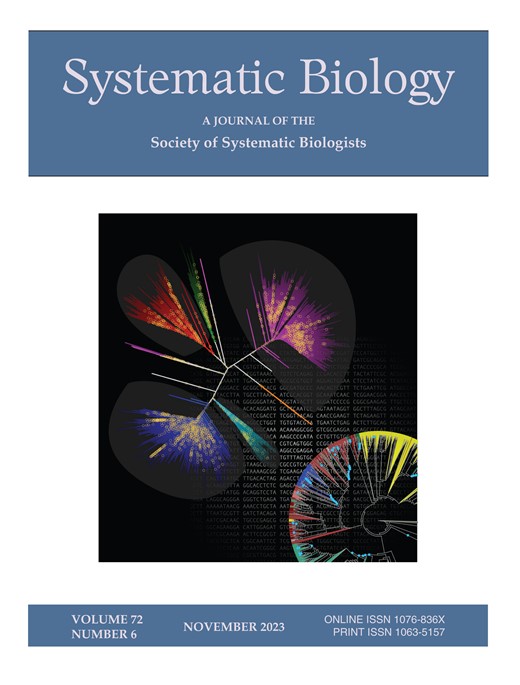PickMe: Sample selection for species tree reconstruction using coalescent weighted quartets
IF 5.7
1区 生物学
Q1 EVOLUTIONARY BIOLOGY
引用次数: 0
Abstract
After collecting large data sets for phylogenomics studies, researchers must decide which, genes or samples to include when reconstructing a species tree. Incomplete or unreliable, data sets make the empiricist’s decision more difficult. Researchers rely on ad hoc, strategies to maximize sampling while ensuring sufficient data for accurate inferences. An, algorithm called PickMe formalizes the sample selection process, assuming that the, samples evolved under the Tree Multispecies Coalescent model. We propose a Bayesian, framework for selecting samples for species tree analysis. Given a collection of gene trees, we compute a posterior probability for each quartet, describing the likelihood that the, species tree displays this topology. From this, we assign individual samples reliability, scores computed as the average of a scaled version of the posterior probabilities. PickMe, uses these weights to recommend which samples to include in a species tree analysis., Analysis of simulated data showed that including the samples suggested by Pickme, produced species trees closer to the true species trees than both unfiltered data sets and, data sets with ad hoc gene occupancy cut-offs applied. To further illustrate the efficacy of, this tool, we apply PickMe to gene trees generated from target capture data from, milkweeds. PickMe indicates more samples could have reliably been included in a previous, milkweed phylogenomic analysis than the authors analyzed without access to a formal, methodology for sample selection. Using simulated and empirical data, we also compare, PickMe to existing sample selection methods. Inclusion of PickMe will enhance, phylogenomics data analysis pipelines by providing a formal structure for sample selection.PickMe:使用聚结加权四重奏进行物种树重建的样本选择
在为系统基因组学研究收集了大量数据集之后,研究人员必须决定在重建物种树时包括哪些基因或样本。不完整或不可靠的数据集使经验主义者的决策更加困难。研究人员依靠特别的策略来最大化采样,同时确保足够的数据进行准确的推断。一种名为PickMe的算法将样本选择过程形式化,该算法假设样本在树多物种聚合模型下进化。我们提出了一个贝叶斯框架来选择样本进行物种树分析。给定一组基因树,我们计算每个四重奏的后验概率,描述物种树显示这种拓扑结构的可能性。由此,我们分配单个样本的可靠性,分数计算为后验概率的缩放版本的平均值。PickMe使用这些权重来推荐在物种树分析中包含哪些样本。对模拟数据的分析表明,包括Pickme建议的样本,所产生的物种树比未过滤的数据集和使用特设基因占用截止值的数据集更接近真实的物种树。为了进一步说明该工具的有效性,我们将PickMe应用于从乳草的目标捕获数据生成的基因树。PickMe指出,与作者在没有正式的样本选择方法的情况下分析的样本相比,更多的样本可以可靠地包括在以前的乳草系统基因组分析中。使用模拟和经验数据,我们还比较了,PickMe与现有的样本选择方法。包含PickMe将通过提供样本选择的正式结构来增强系统基因组学数据分析管道。
本文章由计算机程序翻译,如有差异,请以英文原文为准。
求助全文
约1分钟内获得全文
求助全文
来源期刊

Systematic Biology
生物-进化生物学
CiteScore
13.00
自引率
7.70%
发文量
70
审稿时长
6-12 weeks
期刊介绍:
Systematic Biology is the bimonthly journal of the Society of Systematic Biologists. Papers for the journal are original contributions to the theory, principles, and methods of systematics as well as phylogeny, evolution, morphology, biogeography, paleontology, genetics, and the classification of all living things. A Points of View section offers a forum for discussion, while book reviews and announcements of general interest are also featured.
 求助内容:
求助内容: 应助结果提醒方式:
应助结果提醒方式:


